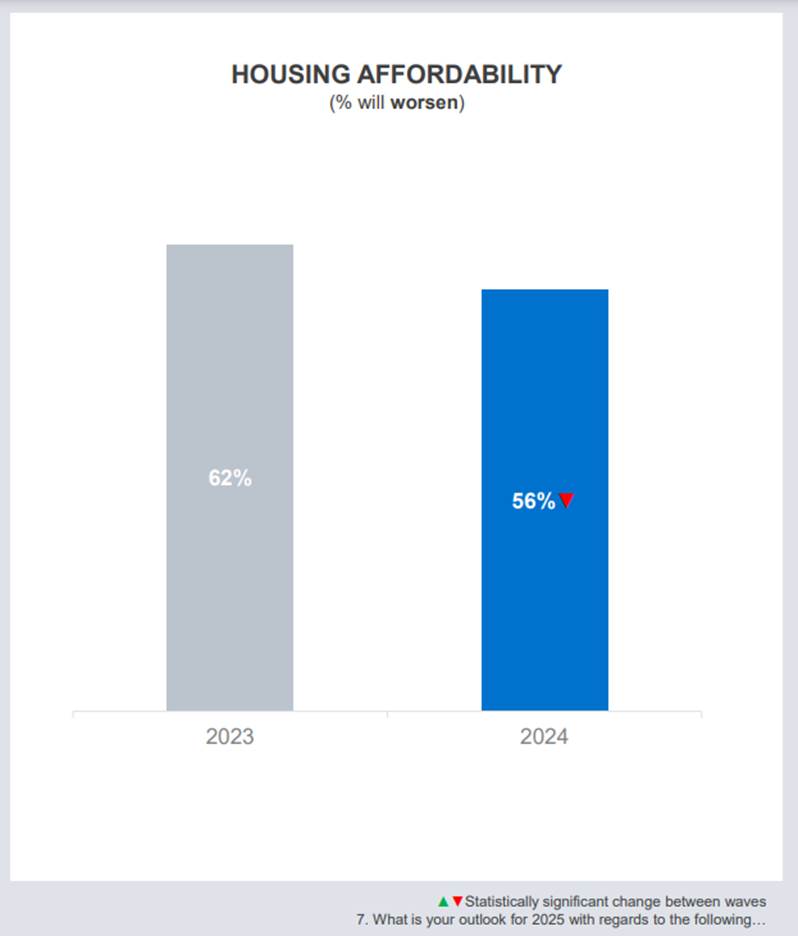Canadians worry about housing affordability as mortgage rates, rent, and home prices continue to climb

Canadians remain uncertain about housing affordability as home prices and rent costs continue to rise, according to the IG Wealth Management Financial Confidence Index.
The report, conducted in partnership with Ipsos Canada, found that 56 percent of Canadians expect housing affordability to worsen in 2024.

Source: IG Wealth Management Financial Confidence Index
While economists anticipate a rebound in the housing market, many Canadians remain skeptical. A quarter of respondents believe mortgage rates will increase this year, while 57 percent of renters expect their rent to rise.
Additionally, homeowners feel more financially stable, with 54 percent more comfortable making a major purchase—such as a car—compared to a year ago. In contrast, only 38 percent of renters share that confidence.
The Canadian Housing Market Report shows that as of November 2024, the average home price reached $696,166, reflecting a six percent increase from 2023.
In Alberta, the price surge was more pronounced, rising by 19.5 percent over the past year.
“Housing affordability is a persistent concern for Canadians coast-to-coast,” said Alana Riley, head of Mortgage, Insurance, and Banking at IG Wealth Management.
She emphasized that the right mortgage strategy, integrated into a financial plan, can help Canadians find long-term solutions that align with their lifestyle and financial goals. Riley added that financial advisors can play a key role in providing guidance for greater financial security.
Renters continue to experience significant cost increases.
According to the Canada Mortgage and Housing Corporation, the average rent for a two-bedroom apartment in 2024 rose by 5.4 percent to $1,447.
Although this is a smaller increase than the eight percent seen in 2023, affordability remains a concern, particularly for new tenants facing substantial rent hikes.
The IG Wealth Management Financial Confidence Index also highlights regional disparities in housing affordability.
In Quebec, 75 percent of renters expect rent increases in 2024, compared to a national average of 57 percent. Facing these challenges, four in ten renters anticipate downsizing or sharing living spaces with others.
“With support from a financial advisor, Canadian renters can implement key strategies like developing a detailed budget and savings plan, establishing an emergency fund, and strategies to pay down debt, all of which can help them better optimize their cashflow and finances to absorb any increase in their monthly rent,” said Riley.
The IG Wealth Management Financial Confidence Index suggests that despite challenges in the housing market, Canadians are experiencing a period of relative economic stability following recent uncertainty.
The Index, which measures financial confidence, has stabilized after a downward trend since 2021.
However, financial concerns persist. Canadians remain cautious about their financial future, with many still cutting back on non-essential expenses.
Additionally, trust in the economy remains fragile, particularly in Quebec, where confidence in financial planning and literacy has declined.
The survey found that partnering with financial professionals enhances financial confidence. Canadians who receive professional financial advice report a higher level of confidence in managing their money, planning for the future, and navigating economic challenges.



